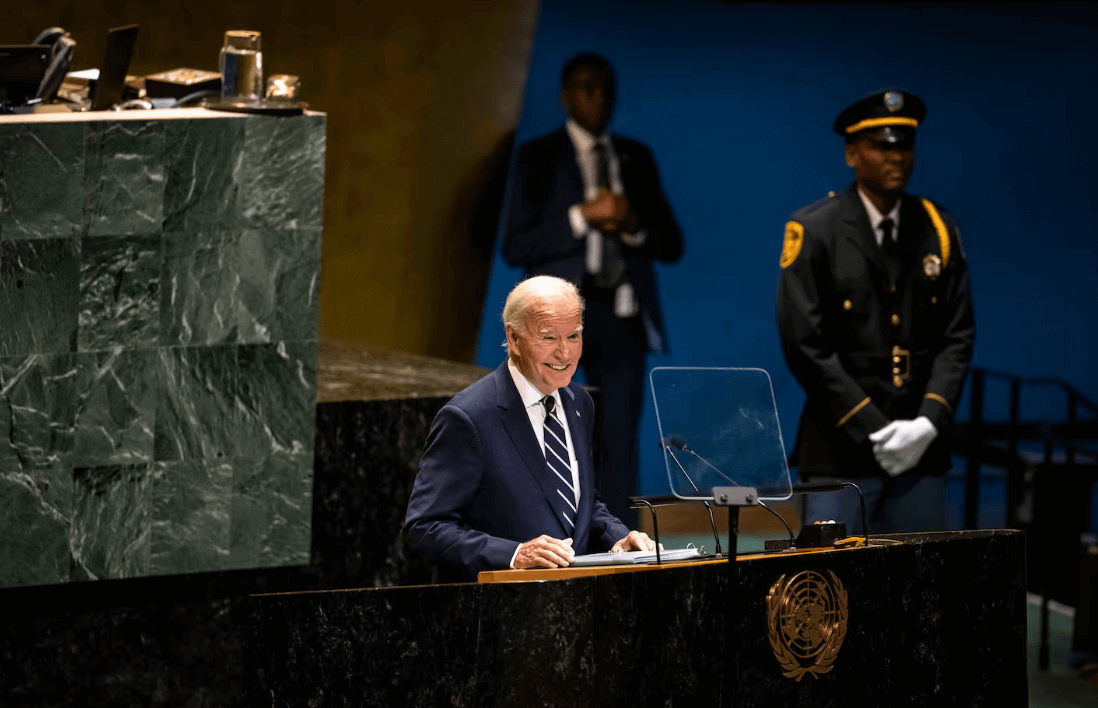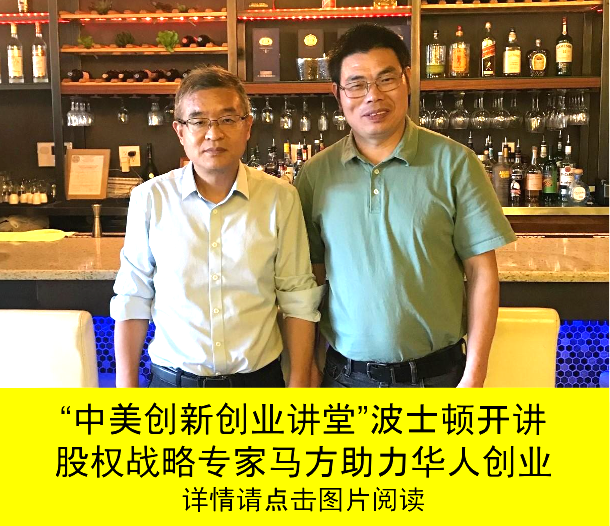拜登在联合国警告称,世界正处于“转折点”

【中美创新时报2024 年 9 月 25 日编译讯】(记者温友平编译)乔·拜登总统周二在联合国发表的最后一次讲话中,庆祝他保卫乌克兰免受俄罗斯入侵以及他为恢复美国全球联盟所做的努力,但他也警告称,如果美国重回孤立主义,他的政府所取得的进展很容易土崩瓦解。《纽约时报》记者谢丽尔·盖伊·斯托尔伯格和大卫·E·桑格(Sheryl Gay Stolberg and David E. Sanger)对此作了下述详细报道。
在向联合国大会发表的 20 多分钟的讲话中,拜登将个人风格与政策要求和对民主的热情辩护结合在一起。他回顾了自己的政治生涯,从 1972 年 29 岁时当选参议员,到两个月前“艰难”决定放弃竞选连任——他把这个决定视为其他国家元首的教训。
“我的领导人同胞们,”拜登说,“让我们永远不要忘记:有些事情比继续掌权更重要。”
毫不奇怪,拜登重点关注美国和西方对乌克兰入侵的反应,宣称美国及其盟友,主要是北约,“确保了乌克兰作为一个自由国家的生存”。
但他没有评估自己在被他描述为时代核心挑战方面的表现:确保民主战胜专制。他承认,乌克兰阻止俄罗斯的力量可能是短暂的——这一点为拜登周四在白宫会见乌克兰总统泽连斯基奠定了基础。
“我们不能厌倦,我们不能视而不见,”总统宣称,这可能是他最后一次机会来争取全球支持这场在他的总统任期中发挥了核心作用的冲突。
拜登上任时承诺恢复美国在世界上的领导地位。“美国回来了,”他喜欢这样说。他利用周二在联合国的讲话来强调其政府在全球参与方面的努力,从对发展中国家清洁能源和清洁水的投资,到他在讲话中宣布的新承诺,即斥资 5 亿美元并捐赠 100 万支疫苗,以应对非洲日益严重的牛痘疫情。
但拜登也必须面对他的承诺的局限性。在他周围,仍有许多问题需要解决。在加沙地带,经过 11 个月的战斗后,以色列和哈马斯之间的停火仍未实现。就在拜登发表讲话时,以色列对激进组织真主党的猛烈炮击仍在黎巴嫩进行,造成越来越多的平民伤亡,威胁着中东的多线战争。加沙和乌克兰面临日益恶化的人道主义危机。
“美国回来了,没错——他可以证明这一点——但其领导能力受到严重限制,”长期担任中东和平谈判代表、曾为两党总统提供咨询的亚伦·戴维·米勒 (Aaron David Miller) 说。“我认为,拜登政府是一个警示故事,说明国际环境有多么复杂和令人惊讶,以及美国实力的局限性。”
周四,拜登在白宫接待泽连斯基时,将面临新的压力,要求他允许乌克兰使用美国远程导弹深入俄罗斯领土——他一直抵制这一举措,担心这会让美国与两大核武对手之一发生直接冲突。
泽连斯基表示,他将来美国介绍他的“胜利计划”,拜登将是第一个看到它的人。他还将会见两位总统候选人——副总统卡马拉·哈里斯和前总统唐纳德·特朗普。 “这场战争不能靠谈判平息,”他在周二联合国安理会的一次讲话中说。“需要采取行动。”
虽然泽连斯基将于周三在联合国大会上发言,但俄罗斯总统弗拉基米尔·普京不会出席;俄罗斯的代表是其长期担任外交部长的谢尔盖·拉夫罗夫。拜登利用他的讲话抨击了俄罗斯总统,称普京的战争已经“未能实现他的核心目标”。
中国国家主席习近平也没有缺席这次年度活动,这意味着拜登总统任期内与美国对抗的两个大国几乎不会被听到。拜登没有提到他为阻止中国获得先进技术或在美国销售其最先进的高科技产品所做的努力。但他确实对中国与美国合作阻止致命麻醉品芬太尼的流入表示认可。当天晚些时候,拜登向一个旨在结束合成毒品威胁的全球联盟发表了讲话。
“我感谢合作,”总统在联合国演讲中提到中国时说。“这对我国人民和世界上许多其他国家的人民都很重要。”
拜登承认他的时间不多了——他只剩下几个月的时间来应对一系列严重的全球危机,如果特朗普在一月份连任,他的全球联盟愿景很有可能被抛弃。回顾 1972 年他第一次参加参议院选举,当时正值冷战最激烈时期,美国仍在越南作战,他说当时美国正处于“转折点”,就像今天一样。
“我真的相信我们正处于世界历史的另一个转折点,”他说,重复了他担任总统期间经常说的一句话。“我们今天做出的选择将决定我们未来几十年的未来。”
在中东问题上,拜登强调了平民伤亡。
“他们没有要求这场战争,”拜登谈到加沙数万人丧生,包括哈马斯武装分子和那些被困在交火中的人。他重申哈马斯和以色列必须签署他的停火和人质计划。但今天,随着黎巴嫩新战线的开辟,这项协议似乎比以往任何时候都更加遥远。
几周后就是哈马斯袭击以色列一周年纪念日,总统重申了他长期以来的立场,即以色列有权自卫。
“世界不能在 10 月 7 日的恐怖面前退缩,”拜登说,并补充道,“任何国家都有权利和责任确保这样的袭击永远不会再发生。”
拜登还将演讲的很大一部分用于人工智能的前景和风险——他在去年向大会发表讲话时只是短暂地提到了这个话题。
他说,这项技术带来了希望,“但人工智能也带来了巨大的风险,从深度伪造到虚假信息,从新型病原体到生物武器。”今年,大会通过了一项决议,开始为人工智能制定“全球规则”——拜登表示欢迎这一举措。
拜登在世界舞台上度过了 50 多年的时间——作为参议员,包括担任外交关系委员会主席、副总统和总统。回顾过去,他谈到了他学到的教训。他说,其中之一就是“情况会变得更好”。
他列举了一系列例子:越南战争后的恢复、柏林墙的倒塌、南非种族隔离制度的结束、世界摆脱新冠病毒大流行。他谈到了委内瑞拉和乌干达等地为“自由、正义和尊严”而进行的持续斗争,在那里,同性恋和变性人为自己的权利而战。
“每个时代都面临着挑战,”拜登说。“我年轻时就看到了。今天我又看到了。但我们比我们想象的更强大。我们团结起来比孤军奋战更强大。”
演讲结束后,总统停下来接受掌声。然后他把手放在心上,短暂地挥了挥手,走下舞台——这是他在联合国大会上的第四次也是最后一次讲话。
本文最初发表于《纽约时报》。
题图:拜登总统于 9 月 24 日在纽约联合国总部向第 79 届联合国大会发表讲话。DAVE SANDERS/NYT
附原英文报道:
At UN, Biden warns the world is at an ‘inflection point’
By Sheryl Gay Stolberg and David E. Sanger New York Times,Updated September 24, 2024
President Biden addresses the 79th United Nations General Assembly at UN headquarters in New York on Sept. 24.DAVE SANDERS/NYT
President Joe Biden used his final speech to the United Nations on Tuesday to celebrate his defense of Ukraine against Russia’s invasion and his work to restore the United States’ global alliances, but he also warned that the advances of his administration could easily fall apart if America returned to isolationism.
In an address of a little more than 20 minutes to the U.N. General Assembly, Biden combined personal touches with policy imperatives and an impassioned defense of democracy. He traced the arc of his own political career, from election to the Senate in 1972 at age 29, to his “difficult” decision two months ago to drop his bid for reelection — a decision he framed as a lesson for other heads of state.
“My fellow leaders,” Biden said, “let us never forget: Some things are more important than staying in power.”
Not surprisingly, Biden focused heavily on America’s and the West’s response to the Ukraine invasion, declaring that the United States and its allies, chiefly NATO, had “ensured the survival of Ukraine as a free nation.”
But he stopped short of assessing how he did in what he has described as the central challenge of his time: ensuring that democracy wins out over autocracy. And he acknowledged that Ukraine’s power to hold off Russia could be fleeting — a point that set the stage for Biden’s meeting with President Volodymyr Zelenskyy of Ukraine at the White House on Thursday.
“We cannot grow weary, we cannot look away,” the president declared, in what may be his last opportunity to rally global support behind a conflict that has played a central role in his presidency.
Biden came to office promising to restore American leadership in the world. “America is back,” he liked to say. He used Tuesday’s U.N. speech to spotlight his administration’s efforts at global engagement, from investments in clean energy and clean water in developing nations to a new commitment, announced during his speech, to spend $500 million and donate 1 million vaccines to confront the growing mpox epidemic in Africa.
But Biden must also confront the limits of his promise. All around him, there are problems yet to solve. In the Gaza Strip, a cease-fire between Israel and Hamas remains elusive after 11 months of fighting. Israel’s ferocious shelling of the militant group Hezbollah, which has brought mounting civilian casualties, was underway in Lebanon even as Biden spoke, threatening a multifront war in the Middle East. Gaza and Ukraine face worsening humanitarian crises.
“America’s back, all right — he can make that case — but with severe limitations on its capacity to lead,” said Aaron David Miller, a longtime Middle East peace negotiator who has advised presidents of both parties. “Biden’s administration is a cautionary tale, I think, of just how complicated and surprising the international environment is, and the limitations of American power.”
When he hosts Zelenskyy at the White House on Thursday, Biden will come under new pressure to let Ukraine use American long-range missiles to strike deep into Russian territory — a step he has resisted, fearing it would put the United States into direct conflict with one of its two major nuclear-armed adversaries.
Zelenskyy has said that he is coming to the United States to present his “Plan for Victory,” and that Biden will be the first to see it. He will also meet with the two presidential candidates, Vice President Kamala Harris and former President Donald Trump. “This war can’t be calmed by talks,” he said in a talk before the U.N. Security Council on Tuesday. “Action is needed.”
While Zelenskyy will speak to the General Assembly on Wednesday, Russian President Vladimir Putin, will not; Russia is being represented by its longtime foreign minister, Sergey Lavrov. Biden used his speech to take a shot at the Russian president, saying Putin’s war had already “failed at his core aim.”
Nor is China’s president, Xi Jinping, also skipped the annual event, meaning that the two major powers confronting the United States during Biden’s presidency will be barely heard. Biden made no mention of his efforts to keep China from obtaining advanced technology, or selling its most advanced high-tech products here in the United States. But he did give a nod to China’s cooperation with the United States to stop the flow of the deadly narcotic fentanyl. Later in the day, Biden addressed a global coalition to end synthetic drug threats.
“I appreciate the collaboration,” the president said, referring to China, in his U.N. speech. “It matters for the people of my country, many others around the world.”
Biden acknowledged that his time was short — he has only a few months left to tackle a series of grave global crises and there is a significant risk that his vision of global alliances will be abandoned if Trump reassumes office in January. Reflecting on his first Senate election, in 1972, in the thick of the Cold War and with America still fighting in Vietnam, he said the nation was then at “an inflection point,” as it is today.
“I truly believe we’re in another inflection point in world history,” he said, repeating a line he has used often during his presidency. “The choices we make today will determine our future for decades to come.”
On the Middle East, Biden made a point of highlighting the civilian casualties.
“They didn’t ask for this war,” Biden said of the tens of thousands killed in Gaza, a mix of Hamas militants and those caught in the crossfire. He reiterated the need to for Hamas and Israel to sign on to his cease-fire and hostage plan. But today, that agreement seems further away than ever, with the opening of a major new front in Lebanon.
With the one-year anniversary of the Hamas attack against Israel coming up in a few weeks, the president reiterated his long-held position that Israel has a right to defend itself.
“The world must not flinch from the horrors of Oct. 7,” Biden said, adding, “Any country would have the right and responsibility to ensure that such an attack could never happen again.”
Biden also devoted a significant portion of his speech to the promise and risks of artificial intelligence — a topic he referred to only fleetingly during his address to the General Assembly last year.
The technology brings promise, he said, “but AI also brings profound risks, from deepfakes to disinformation to novel pathogens to bio weapons.” This year, the General Assembly passed a resolution to start developing “global rules of the road” for AI — an initiative Biden said he welcomed.
Biden has spent more than 50 years on the world stage — as a senator, including a stint as chair of the Foreign Relations Committee, as vice president and as president. Reflecting on time, he spoke of the lessons he has learned. One of them, he said, is that “things can get better.”
He ticked off a string of examples: recovery from the Vietnam War; the fall of the Berlin Wall; the end of apartheid in South Africa; the world’s emergence from the coronavirus pandemic. He spoke of ongoing battles for “freedom and justice and dignity” in places like Venezuela and also Uganda, where gay, lesbian and transgender people have fought for their rights.
“Every age faces its challenges,” Biden said. “I saw it as a young man. I see it today. But we are stronger than we think. We’re stronger together than alone.”
When the speech was over, the president paused to take in the applause. Then he put his hand on his heart, gave a brief wave and walked off the stage — his fourth and final address to the United Nations General Assembly behind him.
This article originally appeared in The New York Times.



